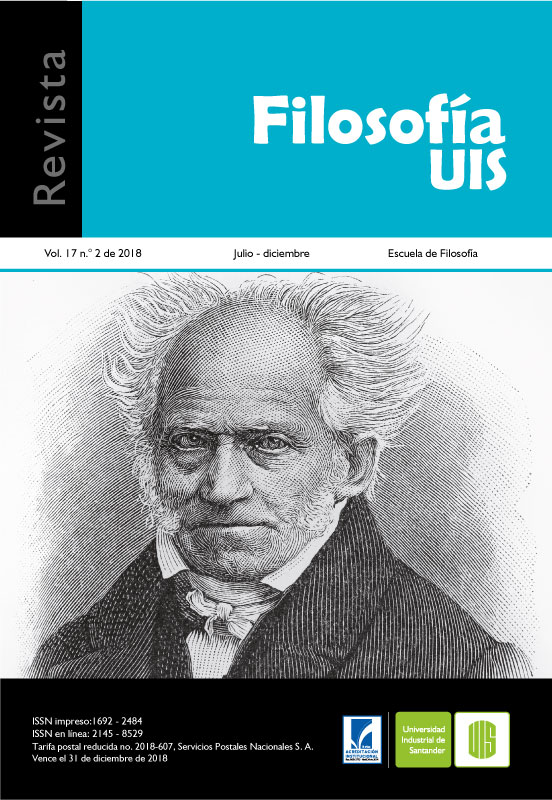Differentiation between the metaphysical freedom/slavery and the juridical-political-social freedom/slavery: Cicero, Seneca and Epictetus
Published 2018-07-31
Keywords
- freedom,
- slavery,
- wisdom,
- ancient ethics,
- roman politics
How to Cite
Copyright (c) 2018 Revista Filosofía UIS

This work is licensed under a Creative Commons Attribution 4.0 International License.
Abstract
In this article we identify that the philosophers Marcus Tullius Cicero, Lucius Annaeus Seneca and Epictetus conceive a “freedom” that is characteristic of the wise and happy, and a “slavery” that is characteristic of the unwise and unhappy, nevertheless they did not use a special word for them. We name such conceptions “metaphysical freedom” and “metaphysical slavery” respectively. And we demonstrate that, in divergent intensities and objectives and in many places, the three thinkers differentiated this freedom/slavery principally from the juridical-political-social freedom/slavery.
Downloads
References
Barnes, J. (1997). Logic and the imperial Stoa. Leiden: Brill.
Bobzien, S. (1998). Determinism and freedom in stoic philosophy. New York: Oxford University Press.
Boeri, M. (2002). La racionalidad del suicidio en el estoicismo antiguo. En R. Buzón; P. Cavallero; A. Romano y M. Steinberg. (Eds.), Los estudios clásicos ante el cambio de milenio. Vida. Muerte. Cultura. Tomo I. Buenos Aires: Universidad de Buenos Aires.
Boeri, M. (2014). Present time and indifferents: making room for ‘what depends on us’ in Marcus Aurelius. En P. Destrée; R. Salles y M. Zingano. (Eds.), What is Up to Us? Studies on Agency and Responsability in Ancient Philosophy. Sankt Augustin: Academia Verlag.
Braicovich, R. (2008). La posibilidad de la ‘acción libre’ en las Disertaciones de Epicteto. Revista de Filosofía, (64), 17-31.
Braicovich, R. (2014). Moderación y ascetismo en Séneca, Musonio y Epicteto. Praxis Filosófica, (39), 157-169.
Brennan, T. (2005). The stoic life. Emotions, duties and fate. New York: Oxford University Press.
Brun, J. (1997). El estoicismo. Toluca: Universidad Autónoma del Estado de México.
Champlin, E. (2008). Nerón. Ciudad de México: Fondo de Cultura Económica-Turner.
Cicerón, M. (1980). Los oficios. En Tratados morales. Ciudad de México: Grolier.
Cicerón, M. (2000). Paradoxa stoicorum. Ciudad de México: Universidad Nacional Autónoma de México.
Cooper, J. (2007). The relevance of moral theory in moral improvement in Epictetus. En T. Scaltas y A. Mason. (Eds.), The philosophy of Epictetus. New York: Oxford University Press.
Dilthey, W. (1980). Historia de la filosofía. Ciudad de México: Fondo de Cultura Económica.
Dragona-Monachou, M. (2007). Epictetus on freedom/ Parallels between Epictetus and Wittgenstein. En T. Scaltsas y A. Mason. (Eds.), The philosophy of Epictetus. New York: Oxford University Press.
Epicteto (2010). Disertaciones por Arriano. Madrid: Gredos.
Everitt, A. (2003). Ciceron. New York: Random House.
Frede, M. (1993). La doctrina estoica de los afectos del alma. En Las normas de la Naturaleza, Estudios de ética helenística. Buenos Aires: Manantial.
Gagin, F. (2011). Lo público y lo privado en los filósofos griegos. La cuestión de la libertad. Praxis filosófica, (15), 97-110.
Graver, M. (2007). Stoicism and emotion. Chicago: The University of Chicago Press.
Hanchey, Dan. (2013). Cicero, Exchange, and the Epicureans. Phoenix, (67), ProQuest, 119-134.
Holland, T. (2007). Rubicón. Auge y caída de la República romana. México: Planeta.
Jaspers, K. (1980). Origen y meta de la historia. Madrid: Alianza Editorial.
Kapust, D. (2012). Cicerón: El decorum y la moralidad de la retórica. Praxis Filosófica, (35), 257-282.
Kennedy, G. (2014). Cicero, Roman Republicanism and the Contested Meaning of Libertas. Political Studies, 62(3), 488-501.
Long, A. (1996). Stoic Studies. New York: Cambridge University Press.
Long, A. (2002). Epictetus. A stoic and Socratic guide to life. New York: Oxford University Press.
Michel, A. (1990). La filosofía en Grecia y Roma desde el 130 a. de C. hasta el 250 d. de C. En B. Parain. (Ed.), Historia de la filosofía, Del mundo romano al islam medieval. México: Siglo XXI Editores.
Nussbaum, M. (2002). La terapia del deseo: teoría y práctica en la época helenística. Barcelona: Paidós.
Nussbaum, M. (2016). Anger and Forgiveness. Resentment, Generosity, Justice. Oxford: Oxford University Press.
Picos Bovio, R. (2013). Marco Tulio Cicerón: Apuntes para una filosofía de la amistad. Tópicos, Revista de Filosofía, (45), 49-82.
Renan, E. (1990). Marco Aurelio y el fin del mundo antiguo; precedido de la plegaria sobre la Acrópolis. México: Editorial Porrúa.
Salles, R. (2009). Los estoicos y el problema de la libertad. México: Universidad Nacional Autónoma de México.
Salles, R. (2014). Epictetus and the causal conception of moral responsibility and what is ephhemin. En P. Destrée; R. Salles y M. Zingano. (Eds.), What is Up to Us? Studies on Agency and Responsability in Ancient Philosophy. Sankt Augustin: Academia Verlag.
Séneca, L. (2008). Epístolas morales a Lucilio. Tomos I y II. Madrid: Gredos.
Thorsteinsson, R. (2010). Roman christianithy & roman stoicism. A comparative study of ancient morality. New York: Oxford University Press.
Ukaulor, C. (2015). Friendship in Cicero: A Pre-Condition for Development. Open Journal of Philosophy, (5), doi: http:/dx.doi.org/10.4236/oipp.2015.54029
Veyne, P. (1995). Séneca y el estoicismo. México: Fondo de Cultura Económica.
Vogt, K. (2008). Law, reason and the cosmic city, Political philosophy in the early stoa. New York: Oxford University Press.
Zamora Calvo, J. M. (2017). Los estoicos y la cuestión de la familiaridad (οικέιοσισ): La propuesta de Hierocles. Praxis Filosófica, (45), 11-27.
